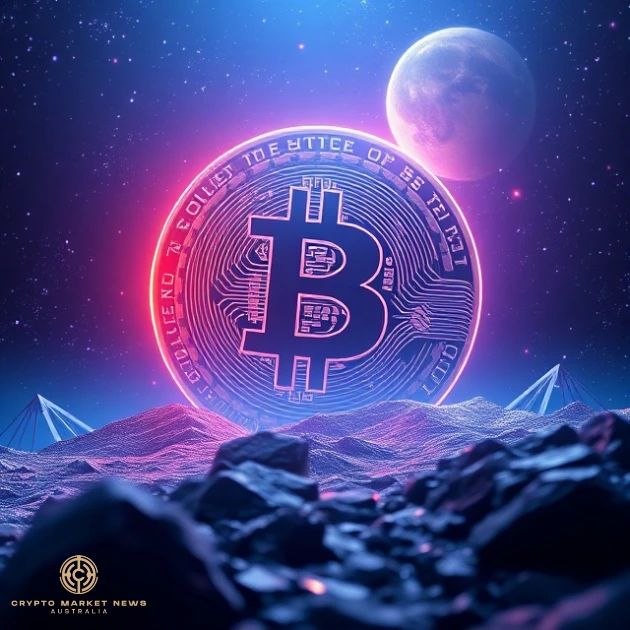The global trade market is in a state of flux. Concerns over potential tariffs, not to mention the threat of a potential global trade war, have led to speculation about the world’s financial markets. At the top of the list of discussions is the potential for Bitcoin to become the pre-eminent reserve currency across the globe.
Bitcoin news is abuzz with the possibility. While it doesn’t necessarily feel like the most likely outcome, there is at least the potential. The most hardcore of believers in Bitcoin have been saying that this is a possibility for years. The question remains: why?
Coinbase CEO Comments
Perhaps rekindling the discussion of Bitcoin becoming the world’s reserve currency are comments from Coinbase CEO Brian Armstrong. On his X account, Armstrong made note of the nearly $37 trillion U.S. national debt. “If the electorate holds Congress accountable for reducing the deficit and starts paying down the debt, Bitcoin is going to take over as reserve currency,” Armstrong said.
“I love Bitcoin, but a strong America is also super important for the world,” Armstrong continued. “We need to get our finances under control.”
As sentiments on the matter continue to rise, Gemini CEO Tyler Winklevoss posted “buy Bitcoin”, further spurring action behind the vaunted token. These suggestions continue to gain steam as rising U.S. debt increases the probability of a negative impact on investor confidence.
Many believe that serious cracks have already begun to show. With uncertainty abounding, investors have been conservative and haven’t flocked toward U.S. Treasury bonds or the dollar as they have in the past.
Economists Michael Klein and Charles Collyns have also warned that this could pave the way for other reserve currencies to pop up and emerge in lockstep with the dollar. The most speculated of those potential options is, of course, Bitcoin.
Does Bitcoin Meet the Criteria?
Of all the discussions about Bitcoin becoming the reserve currency, the one not enough people are talking about is, “Does Bitcoin meet the criteria to become a reserve currency?” Whether Bitcoin has the necessary characteristics to meet the classification of a true reserve currency is debatable, at best.
Per the Federal Reserve, money needs to adhere to three critical functions. For one, it must be a store of value. It must also be a medium of exchange. And finally, it must be a unit of account. As of now, Bitcoin doesn’t meet all three of those vital criteria.
True, Bitcoin is a store of value. That said, it isn’t yet a popular medium of exchange when it comes to everyday transactions. Though you can use Bitcoin to pay for certain transactions, it isn’t something you can do at most brick-and-mortar establishments in your community. When you go to the supermarket, you can pay through any number of means – but Bitcoin isn’t one of them.
Though it was initially created to act as a global digital currency, it has been more of a global commodity than anything else. Like stocks, people buy and hold Bitcoin; they don’t necessarily spend it. That’s why people refer to Bitcoin as “digital gold” so often these days. Sure, gold started as a currency, but it has also become a commodity more than anything else.
How Tariffs Play a Role
Another important part of this discussion is the role of tariffs. With the way things are currently, it isn’t difficult to imagine a scenario in the future where Bitcoin achieves the medium of exchange/unit of account requirement. Being realistic, however, it isn’t likely to happen.
For starters, the current global financial system will need to be totally readjusted. We haven’t seen something like that since the 1970s, when the United States moved officially away from the gold standard. It also happened in the 1920s, when the dollar officially replaced the pound in terms of global reserve currency.
As the U.S. deficit – the aforementioned one from the 1920s – continues to climb and the threat of a global trade war looms, some investors feel that their countries will turn on the U.S. dollar. When looking for a replacement, Bitcoin feels like the natural successor because of its appeal globally, not to mention its non-sovereign status.
All that considered, foreign investors would have to achieve a massive agreement among all of the largest trading nations to swap the dollar out with Bitcoin. It isn’t without precedent – check the Bretton Woods Agreement of 1944 – but its likelihood is slim.
Bitcoin Hoarding Causing an Issue
Should a major trade war take place because of the tariff situation, experts feel like top trading nations could come together to discuss a move that would take them away from the current dollar-based international finance system.
Even if that happens, Bitcoin becoming the new global reserve currency seems unlikely. This is in large part because of hoarding issues on the part of companies, governments, and individuals. Some entities have publicly pledged to never sell their shares of Bitcoin, creating the very realistic possibility that finding new Bitcoin could become quite difficult. There are even some exchanges noting that they are running out of Bitcoin.
Reports have shed light on the Bitcoin hoarding issue. For instance, Strategy has become the largest holder of Bitcoin across the globe, holding around 3% of all Bitcoin in circulation. The more Strategy holds for its own corporate treasury, the less likely it becomes that Bitcoin will become the new global reserve currency. It is believed that once Strategy hoards 5% of all global Bitcoin, the possibility of Bitcoin becoming the new global reserve currency will be gone.
A combined report from Glassnode and Gemini pointed out that a whopping 30% of all global Bitcoin is held by 216 centralised entities. Among these entities are Wall Street banks, cryptocurrency exchanges, corporations, asset management firms, sovereign wealth funds, ETF investment firms, and hedge funds.
What this all equates to is just how “decentralised” Bitcoin really is. Though it was created to be decentralised, it is now becoming a highly centralised form of currency because of who holds it. What happens if trends continue in that direction?
The Future for Bitcoin?
Whether it becomes the next global reserve currency or not, the future remains bright for Bitcoin. Those holding Bitcoin right now probably don’t truly care whether it becomes a global reserve currency. If anything, people will only continue to buy Bitcoin in the same manner that people continue to buy gold.
If anything, demand has continued to soar for the OG cryptocurrency token. Even more telling for the future of Bitcoin is the fact that traditional investors are now buying in. Whereas it used to be for speculative individuals, there are more Wall Street banks, corporations, and even sovereign governments buying up Bitcoin.
Experts continue to predict a bullish Bitcoin market to come. While the original vision of the token continues to evolve, there is little question that Bitcoin is here to stay. What form it takes in the coming years remains to be seen.

